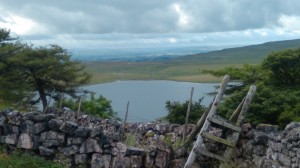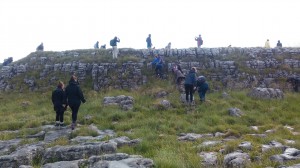Highlights from a day in the life of a BES Mentor
Joining the undergraduates on their five-day whirlwind tour of ecology packed with lectures, excursions, lab work and tutorials; our Summer School PhD Mentors are sharing their daily schedule favourite anecdotes…
6:00am Birdwalk
Rosie: The bird walk was a definite highlight for me, a bit of exploring early in the morning – a real treat and a great way to learn a few common birdcalls. The enthusiasm from the mentees was fantastic and we were soon engrossed in spotting tree creepers, watching a nuthatch and listening to the alarm calls of a rather annoyed wren. Spotting a charm of goldfinches and then seeing a tawny owl fly through the trees was definitely worth the early start. As we walked through the woods to the tarn, it made me realise how inspiring Malham is, such a species rich area, we were soon distracted by some more candidates for the taxonomy challenge – moss, obviously. We slipped a few specimens in our pockets and headed back for some early morning ID.
7-8am Breakfast
Rosie – “Day 4, I’ve cracked the great breakfast dilemma – banana, weetabix and honey – boom!”
Jen – “It’s so beautiful here…I’m walking to breakfast through a woodland! And look at the hills! It’s so –” *Narrowly avoids walking into a student* “Whoops, ok, eyes on the road…”
Lewis – “I’ve already been up 2 hours IDing moths with these talented and eager prodigies; please move aside as I make my 4th beeline for the tea – TGIY: thank god it’s Yorkshire”
Lydia – “Are those sausages really vegetarian? They taste like meat. I mean who wants a veggie sausage tasting of meat? “
9-11am Plenary: Pests, pathogens and unpredictable rainfall: global challenges for sustainable food production.
Amy: Professor Sue Hartley delivered the first plenary. I almost didn’t make it, having locked myself in the luggage van moments before. I’m glad I was rescued in time, the talk was not to be missed! Sue engagingly discussed the increasing challenges for sustainable food production, before revealing how the science of plant-herbivore interactions could hold a solution… silicon! Silicon is an inducible anti-herbivory defence in plants. Now for the clever science. So called ‘super-crops’ can be engineered to take up more silicon, increasing pest and disease resistance. This increases yield without having to cultivate more land, helping build a more sustainable future.
Afterwards, mentor groups were asked to devise a scientifically valid and stimulating question – something all budding ecologists need to master. One group asked, ‘Is this a viable solution for meeting the increase in food demand and are there other options?’ To which Sue replied, ‘Yes, but not on its own. There is a range of research being carried out simultaneously to tackle the problem’. Sue finished by stating that over-consumption of meat is perhaps the biggest problem, revealing that she was a vegetarian. The message obviously stuck, as the vegetarian option soon ran out at dinner that evening.
11-12am Making of a bog
Ever wondered how a bog was formed? An interactive game about bog formation ensues involving the undergrads. Mentors having a wee break to talk about zombie apocalypse survival strategies and Malham field centre really is the best option.
Lewis – *sneaks away to attend to emails* … *rapidly regrets this most boring of decisions*
Other mentors engrossed in a discussion about zombie apocalypse survival techniques
12-1 Lunch and Social time
We pack our own lunches during breakfast. There are cold cuts, tuna, egg salad, cheese and salads. The spread is suitably filling but nothing compared with the gorgeous afternoon tea treats which consist of homemade cookies and cakes. We find them irresistible (and sometimes too sweet), but the perfect pick-me-up towards the end of a long afternoon.
1-2pm Guided Nature walk
Peter Walsh and Steven Morley of the National Trust lead us in a tour of Malham Tarn nature reserve. We spot sundews, bumblebees and cotton grass along the bog boardwalk, and raptors wheeling above the limestone pavements.
2-4pm Lecture and lab work
Jill: On day 4, we went to the underworld….where microbial interactions strongly influence the health of vegetation aboveground. I presented an introductory talk about types of mycorrhizae that is symbioses between plants and fungus. We learned some of these evolutionary plant-fungi relationships are very specific while others partner with many plant species. Also, some mycorrhiza form only with grasses while others prefer orchids or trees. After the introduction ‘’we got dirty’’ looking at plant roots under dissecting and compound microscopes. We saw nitrogen-fixing bacteria amongst the Fabaceae family plants and Calluna vulgaris roots colonized by mycorrhizal fungus; not to mention nematodes and mites. We also heard from Dr, Rob Griffiths, from the Center of Ecology and Hydrology. Rob introduced the complex web of microbial diversity, which draws our attention to the true complexity of ecological food webs.
4-4.30pm Tea break
Lydia – “Coffee queue? Guys let me pass this is an emergency!”
Rosie – “This cake is just too sweet, too much butter…but I will have another piece….and another”
4.14 Change of plans – aka lets take a risk
Lydia: With only three hours left before final presentations one of my mentee groups decided to change their topic to do something ‘more out there’. This came as a surprise after four days of designing their mini research project on coral ecology in the face of climate change. The past few day they had been studying the literature, working on methods, experimental design, costs and presented their ideas for feedback – all in their free time (a scarce commodity at summer school).
I was impressed! It was inspiring so see these guys challenging themselves to do something different and quite quirky (a study on the effects of meditation). Knowing that my mentees felt confident enough to come up with another well designed study and present it in a confident, succinct and engaging manner, made me very proud and showed how much the group had grown in the past few days.
5-6pm Outreach
The mentees explored how best to begin networking given their interests or openness. We had focused chats about exploring what’s ‘out there’ and not being intimidated. The mentors reminded us about the importance of risk taking, at all stages of careers development.
6-7pm Dinner
Lydia – “First at dinner always winner! Lets eat fast and get back to group work.”
Jill – “Vegetarian dining not part of the culture up north. Best to save your calories for the afternoon puddings!”
Jen – “Sponge and custard again, YES! Happy school dinner flashbacks…”
7-9pm Student presentations – Mini research projects
Lewis: It’s a balmy evening overlooking the tarn. We assemble for the research proposals our mentees stitched together during the few spare moments they’d had over the 3 days. My internal monologue begins with the first group, summarised below for brevity:
1 – ‘Wow these guys are impressive! – I struggle enough to pitch PhD chapters with a month to prepare and this lot are holding their own and then some. Good on them’.
3 – ‘Ok these guys have scraped together a few spare hours for this proposal and I would be willing to take that on as a project – glad I won’t be competing against them for PhD funding, wouldn’t stand a chance’.
7- ‘That is a genius idea. They’ve basically done their review already (how?!). I would do that as a PhD. In fact I might just quit my current work and take on that’.
12 – ‘This undergrad presentation is better planned than my entire PhD thesis is after a year of work. I’m done. What’s wrong with me? What’s wrong with these students?! I’m utterly intimidated.’
Lydia – “Tears in my eyes, what a great job they all did!”
9-11pm Social Programme: Mascot challenge & Bat walk
Jen: An intense week of inspiring lectures, practicals and postgraduate-worthy student presentations; even with Yorkshire tea, SURELY energy levels are waning? Should we rethink tonight and let everyone rest? We’ve planned a bat walk and mascot competition. I look at my craft materials dubiously…but the room I walk into is packed and energized. The challenge is set: build an organism new to science and present in true Attenborough style.
As the sky darkens, we pause some alarming feats of creative genius and head outside. Eyes peeled for shadows flitting overhead and ears glued to detectors, we are captivated by glimpses and squeaks of hunting bats. Back inside, a…creature…with far too many pipecleaner appendages is hailed the winner. Looking around, I’m impressed once again at the way this group has bonded in such a short time. There’s no doubt that the experiences, memories and connections of this week will persist into the future.
Lewis – *receives pipecleaner DIY bumblebee from Jen to adorn ecologist hat* “This is the best gift I have ever received I shall treasure it always …”
Like what we stand for?
Support our mission and help develop the next generation of ecologists by donating to the British Ecological Society.


